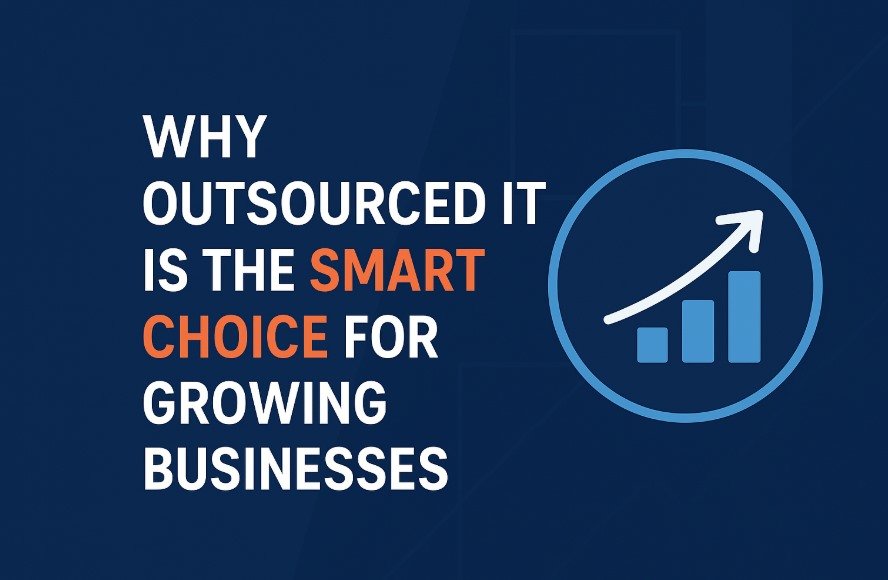
In today’s fast-paced business environment, companies of all sizes depend on technology to manage their operations. From communication systems and data storage to cybersecurity and customer management tools, IT infrastructure has become essential. However, maintaining an in-house IT department is not always the most efficient option, especially for growing businesses that need to focus their resources on expansion. This is where outsourced IT becomes a smart choice. By relying on third-party professionals to manage technology needs, businesses can save money, access expert knowledge, and focus on their core goals.
What is Outsourced IT?
Outsourced IT refers to the practice of hiring external service providers to handle a company’s information technology functions. These functions can include network management, software updates, cybersecurity, helpdesk support, and data backup. Instead of building and maintaining a large internal IT team, companies contract with specialized firms that provide these services on demand. This model allows businesses to pay only for what they need, while still benefiting from professional expertise and modern technology solutions.
Why Growing Businesses Benefit from Outsourced IT
Growing businesses often face unique challenges. They want to expand quickly, serve more customers, and stay competitive, but they also need to manage budgets carefully. Building a full-time IT team requires hiring skilled staff, paying salaries, and providing training, which can be expensive. Outsourced IT reduces these costs by offering access to a complete team of experts at a fraction of the cost.
Another major advantage is scalability. As a company grows, its technology needs change. For example, a small business may only require basic helpdesk support at first. But as it adds employees and customers, it may need advanced network security, cloud services, or compliance management. An outsourced IT provider can adjust the level of service as needed, ensuring that the company always has the right amount of support without overpaying.
Cost Efficiency of Outsourced IT
One of the most important reasons businesses choose outsourced IT is cost efficiency. Running an in-house IT department involves fixed costs such as salaries, benefits, office space, and equipment. In addition, there are hidden expenses like recruitment, training, and turnover. Outsourcing turns these fixed costs into variable costs, allowing businesses to pay for services only when they need them. This makes budgeting easier and frees up money to invest in growth areas like marketing or product development.
Many outsourced IT providers also offer 24/7 monitoring and support, which would be expensive to replicate in-house. This means growing businesses get constant protection and assistance without having to hire around-the-clock staff. For small and mid-sized companies, this level of service is often impossible without outsourcing.
Access to Skilled Expertise
Technology changes rapidly, and keeping up requires continuous learning. When businesses rely on an in-house IT team, they often struggle to stay updated with the latest software, security threats, and best practices. Outsourced IT providers employ specialists with a wide range of skills, from cybersecurity experts to cloud engineers. This gives businesses immediate access to knowledge that would take years to build internally.
For example, if a company faces a ransomware attack, having an outsourced IT team means it can quickly respond with professionals who handle such threats regularly. In contrast, an in-house team with limited experience might take longer to solve the problem, causing more damage.
Focus on Core Business Goals
For growing businesses, time and attention are valuable. When management spends too much energy dealing with IT issues, it distracts from strategic planning, customer service, and innovation. By outsourcing IT, leaders can shift their focus back to what matters most: serving clients and growing revenue. The IT provider takes responsibility for maintaining systems, updating software, and handling support tickets, allowing the business to run smoothly without interruptions.
Improved Security and Compliance
Cybersecurity is a growing concern for businesses of all sizes. Hackers often target small and medium-sized companies because they may not have strong defenses. A data breach can result in financial losses, reputational damage, and even legal consequences. Outsourced IT providers specialize in security and use advanced tools to monitor networks, detect threats, and apply patches quickly.
In addition, many industries have strict regulations for handling customer data. Companies in healthcare, finance, and e-commerce must follow compliance standards. An outsourced IT team understands these requirements and helps businesses stay compliant, reducing the risk of penalties or legal issues.
Reliable Support and Reduced Downtime
System downtime can be costly for a growing business. When servers crash or software fails, employees cannot work and customers may lose trust. Outsourced IT providers often use proactive monitoring tools to identify and fix problems before they cause downtime. They also provide fast response times when issues arise. This level of reliability ensures that businesses can keep operating smoothly, even when technical problems occur.
Scalability and Flexibility
As businesses grow, their IT needs evolve. A company that once managed with a simple email system may later need advanced collaboration tools, customer relationship management software, or cloud storage solutions. An outsourced IT provider can scale services up or down depending on these needs. This flexibility is especially important for businesses that experience seasonal demand or rapid expansion. Instead of hiring and training new staff, the company can simply adjust its outsourced IT plan.
This scalability also means businesses can adopt new technologies without the delays often seen in in-house teams. Outsourced IT providers are usually early adopters of the latest solutions, ensuring that growing businesses can take advantage of innovations without long learning curves or large investments.
Better Technology and Tools
Technology requires constant updates to remain efficient and secure. For small and medium businesses, purchasing the latest tools or maintaining advanced infrastructure can be costly. Outsourced IT providers already invest in modern tools, monitoring systems, and cybersecurity solutions. By working with them, businesses gain access to this technology without the high upfront costs.
For example, many outsourced IT firms offer cloud solutions that allow employees to work securely from any location. This is a major advantage for businesses with remote teams or multiple office locations. They also provide advanced security systems that include firewalls, intrusion detection, and encryption, which are often out of reach for small businesses if handled alone.
Predictable Costs and Budgeting
Financial planning is essential for growing businesses. Outsourced IT provides predictable monthly or yearly costs, making it easier to manage budgets. Many providers offer tiered pricing plans, so companies can choose the level of support that matches their needs and budget. This predictability prevents unexpected expenses that often occur with in-house teams when equipment breaks down or sudden upgrades are required.
With predictable costs, businesses can allocate resources more effectively. Instead of worrying about IT emergencies draining funds, leaders can focus on investing in growth opportunities like new products, employee training, or market expansion.
Competitive Advantage
In competitive industries, the ability to deliver services quickly and securely can determine success. Outsourced IT gives growing businesses an edge by ensuring that technology supports, rather than hinders, operations. A reliable system means fewer delays, faster customer service, and more efficient processes.
Moreover, outsourcing allows businesses to implement new technologies faster than competitors who depend only on internal teams. Access to the latest tools and professional guidance helps companies stay ahead in their market.
Case for Small and Medium Businesses
Small and medium-sized businesses are the ones that benefit most from outsourced IT. They often lack the budget for a full in-house department but still need professional IT support to grow. By outsourcing, they can access enterprise-level technology and expertise without overspending.
These businesses also face increasing cyber risks, and without professional protection, they remain vulnerable. Outsourced IT provides the security and reliability they need to operate confidently, even with limited internal resources.
How to Choose the Right Outsourced IT Provider
Selecting the right provider is critical. Businesses should look for companies with a proven track record, positive client reviews, and clear communication. It is also important to choose a provider that offers services aligned with the company’s needs. For example, if data security is a priority, select a provider with strong cybersecurity services. If remote work is important, find a provider that specializes in cloud solutions.
Transparency is also key. The provider should clearly outline costs, service levels, and response times. A good outsourced IT partner will act as an extension of the business, offering not only technical support but also strategic advice for long-term growth.
Future of Outsourced IT
The demand for outsourced IT is expected to increase as technology becomes more complex and essential for everyday operations. Cloud adoption, artificial intelligence, and automation are changing the way businesses operate. Outsourced IT providers are adapting to these trends, offering services that go beyond simple support. In the future, they will play an even bigger role in helping businesses innovate and stay competitive.
Conclusion
Outsourced IT is not just a cost-saving measure; it is a strategic choice for growing businesses. It provides access to expert knowledge, modern tools, and reliable support while allowing companies to focus on their core goals. With scalability, predictable costs, and improved security, outsourced IT helps businesses grow faster and operate more efficiently.
For companies that want to expand without being held back by technology challenges, outsourcing IT services is the smart choice. It offers the flexibility, protection, and professional support that growing businesses need in today’s digital world. By selecting the right provider, businesses can ensure their IT systems remain reliable and secure, freeing them to focus on long-term success.
Read more: Ftasiastock Insights: Practical Management Tips That Work
































